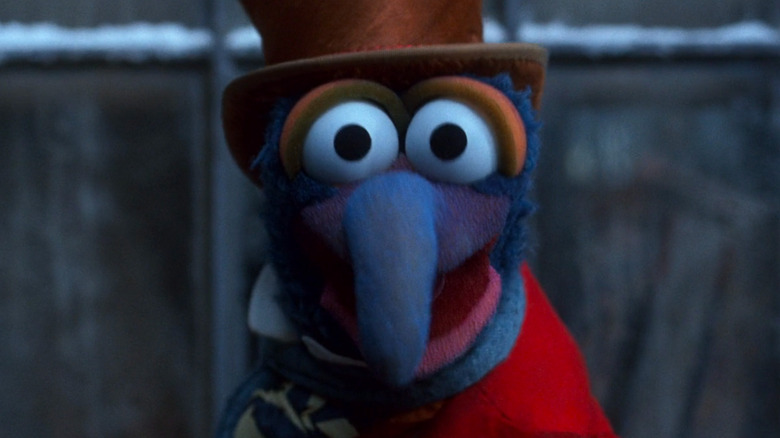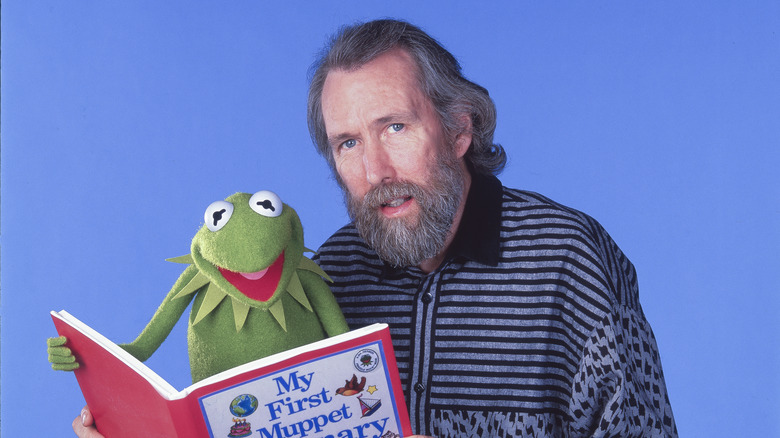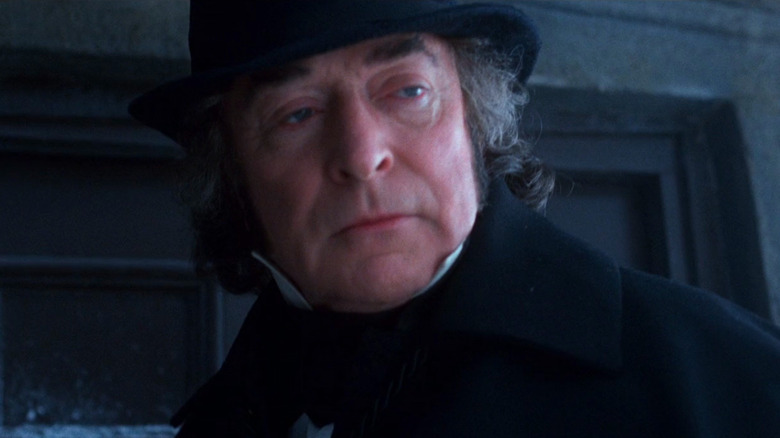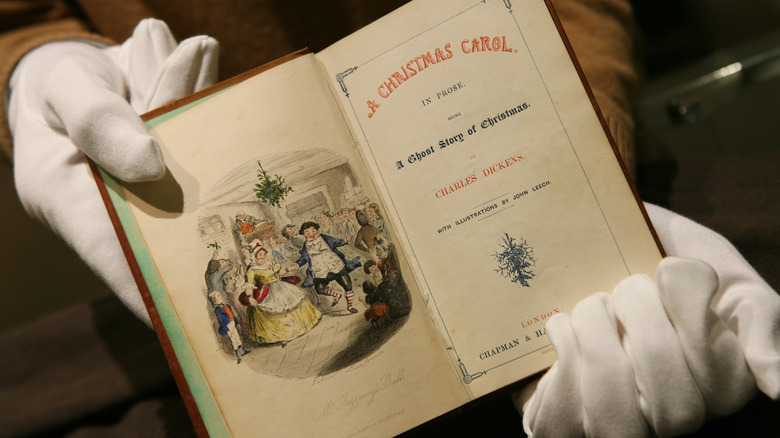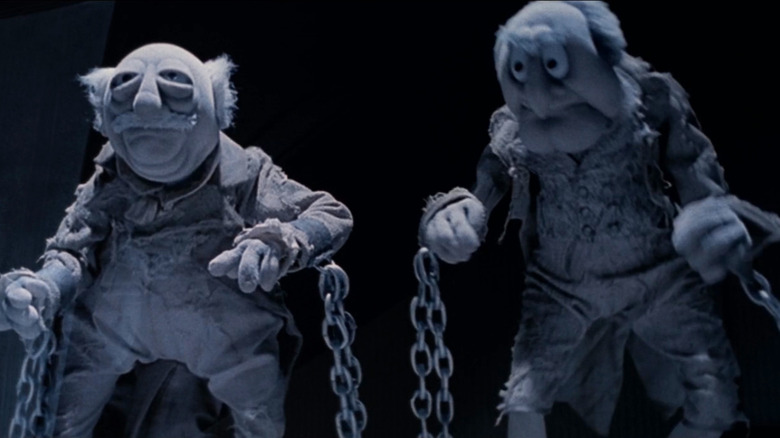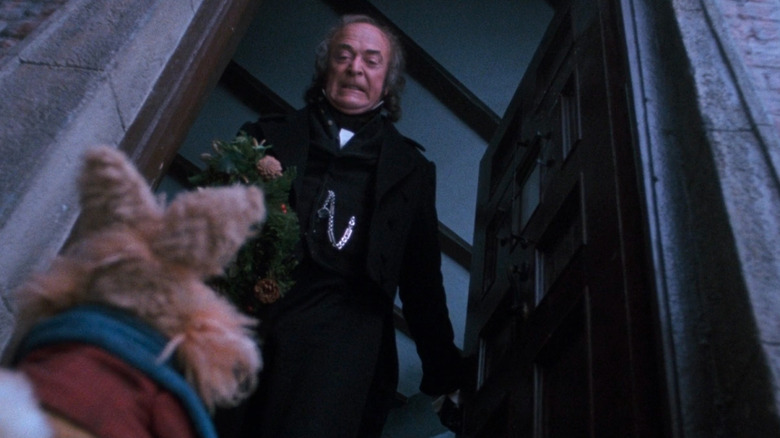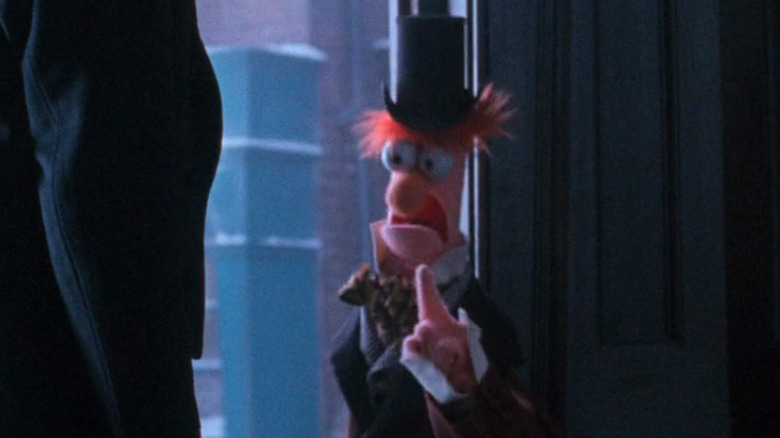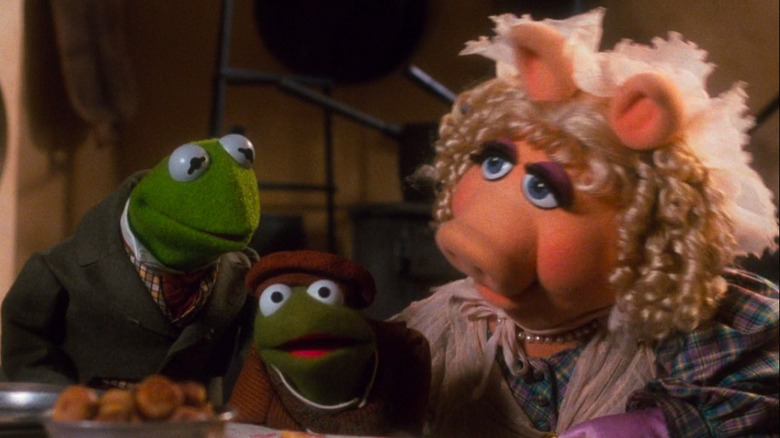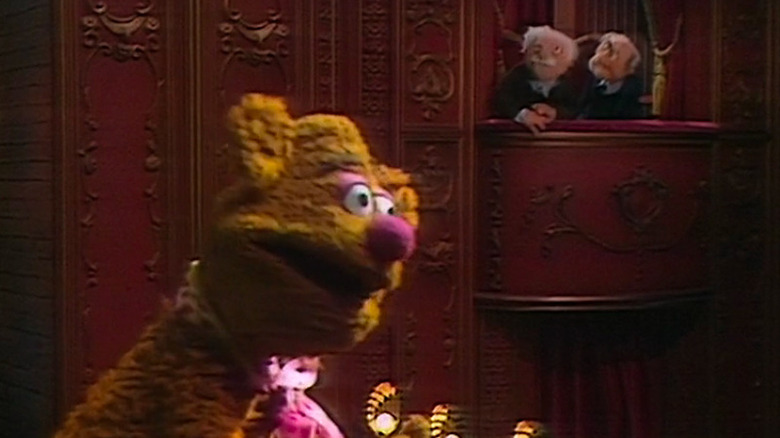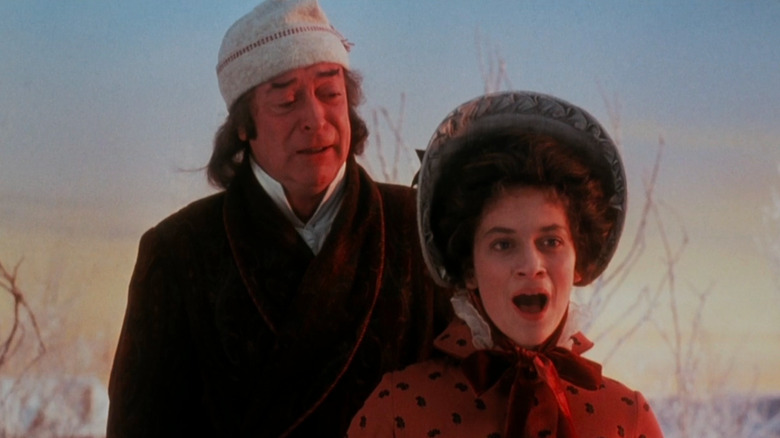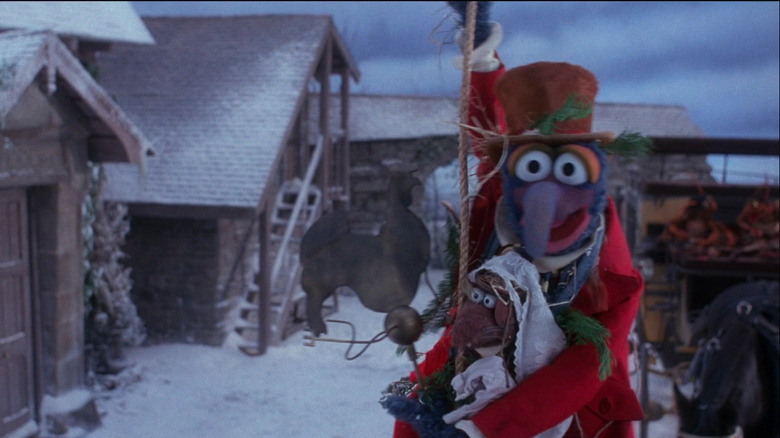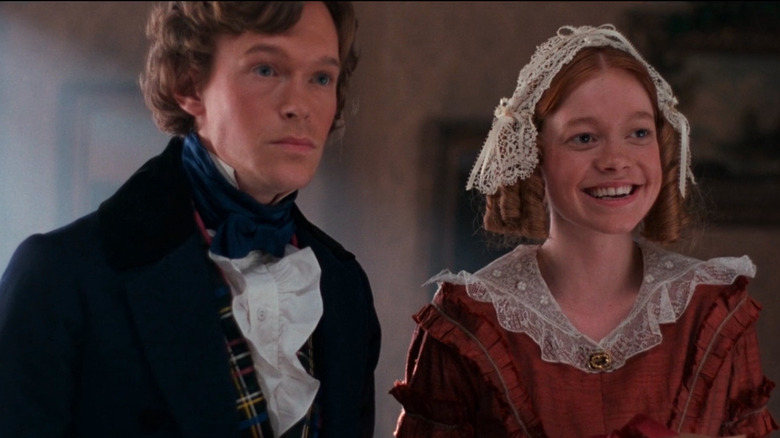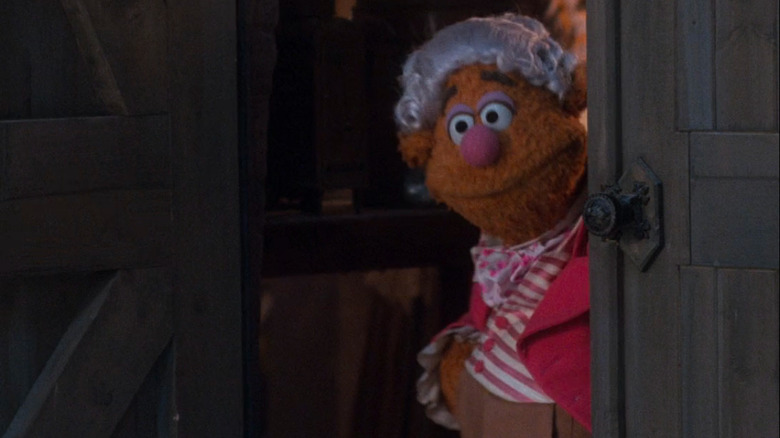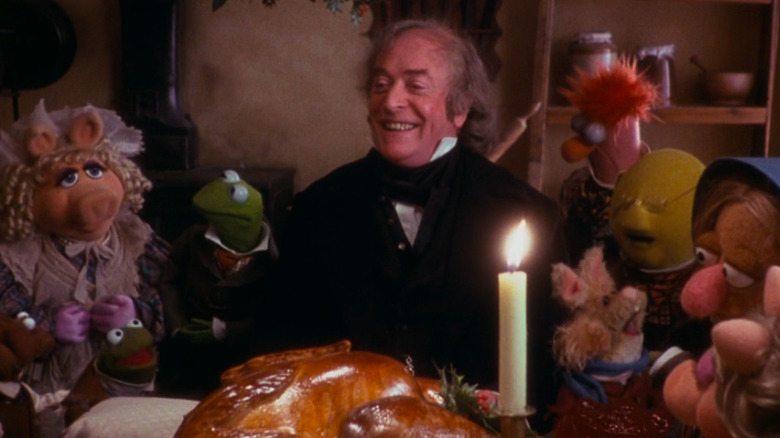Things In The Muppet Christmas Carol Only Adults Notice
It's beginning to look a lot like Christmas, and for many, a viewing of "The Muppet Christmas Carol" is part of the holiday tradition. Despite being told with anthropomorphized puppets, the 1992 film is regarded by some as one of the best adaptations of Charles Dickens' iconic 1843 novella "A Christmas Carol." While Dickens probably never imagined his characters being played by frogs, pigs, and bears — or being portrayed himself by a furry blue daredevil who dates chickens — somehow the mashup of the madcap Muppets and the transformative Christmas tale worked, and the movie has gone on to become something of a Christmas classic in its own right.
Even though "Muppets Christmas" was ostensibly made for children, there are more than a few things about the film that make it very grown up, from the truly terrifying Ghost of Christmas Yet To Come to the tragic recounting of Ebenezer Scrooge's early life. But there are also several other, more subtle things that often fly over the heads of little kids. But like much Muppet material at its best, it is this duality that makes people both young and old appreciate the heartrending, scary, poignant tale. Let's take a brief break from decking the halls and check out 13 things only adults notice in "The Muppets Christmas Carol."
This was the first Muppets movie to be released following Jim Henson's death
Before the story of "The Muppets Christmas Carol" starts, a screen appears with a tribute reading, "In loving memory of Jim Henson and Richard Hunt." While the name Richard Hunt, a puppeteer with the Muppets responsible for characters like Scooter and Janice, isn't widely recognized today, the name Jim Henson will be familiar, even to many kids. Yet, what kids aren't likely to know is that this was the first Muppets movie that was made following Henson's untimely death in 1990. For adults of a certain age, though, that dedication to Henson's memory will serve as a reminder of the shock and sadness widely felt when they learned that Henson had unexpectedly passed away from pneumonia.
As the Muppets' originator, Henson was as beloved during his lifetime as his creations, so his death not only marked the loss of a legend, it marked the end of an era for the pop-culture standby. "The Muppets Christmas Carol" served as something of a passing of the torch, as Henson's son Brian took the reins to direct the new film (choosing the Dickens tale in an attempt to blaze his own path distinct from the previous 3 Muppet films), into which he seemed to pour all the emotions evoked by the memory of his father. In hindsight, it showed the Muppets were in good hands, as the new movie exemplified the familiar Muppets sensibility, a combination of zaniness and heartfelt sentiment that continues their cultural relevance even now, decades after Jim Henson introduced them to the world.
Scrooge is played by a multiple Oscar winner
While the cast of "The Muppets Christmas Carol" largely consists of Muppets of one kind or another, it also includes a towering performance by a human: legendary English actor Michael Caine, who plays Ebenezer Scrooge with all the commitment and nuance that he would bring to the most meaty dramatic role. Yet, even if kids are familiar with Caine's more recent work (like the Batman movies where he played Alfred), they may not appreciate the breadth of his career.
A double Oscar winner and six time nominee, Caine has appeared in more than 130 films. He has made his mark both as a talented actor ("The Cider House Rules") and a working actor ("Jaws: The Revenge," of which he remarked: "Somebody said, 'Have you ever seen Jaws 4?' I said, 'No. But I've seen the house it bought for my mum. It's fantastic!'"). Caine made his name in the '60s/early '70s playing amoralist, gritty characters in now-classic films like "Alfie," "The Ipcress File," "Get Carter" and "Gambit."
Caine is known as a serious actor, so it may be surprising that he chose to do a Muppet movie. However, he turned out to be the perfect choice for the film. Caine said he decided to play Scrooge "absolutely straight, as though I was with the National Theatre or the Royal Shakespeare Company." An unexpected choice that brought extra meaning to the character's transformation from despicable miser to redeemed benefactor, it is one of the reasons the film continues to make such an impression.
The movie puts a fine point on the fact that it's based on a Charles Dickens story
Over 150 years after its initial publication, "A Christmas Carol" remains one of the most well-known Christmas tales ever. Yet, because its basic plot points have been integrated into everything from full-length films to single episodes of cartoons, most kids will be more familiar with the screen versions of the story. Consequently, it's quite possible "The Muppets Christmas Carol" will be the first time children realize what adults already know, that the original narrative was conceived in the mind of Dickens way back in the 19th century.
According to Brian Henson, this was by design. After initially considering making a parody of the Dickens classic, Henson decided it would make more sense to be faithful to the author's original story. "Nobody had ever captured Dickens' prose — the wonderful way he described the scenes," Henson explained. "So we put Charles Dickens into the movie."
By making Dickens a character, played by the surprising choice of Gonzo, the movie educates children about the originator of "A Christmas Carol." Plus, since almost all of what Gonzo says is lifted from the novella, it gives both kids and adults the opportunity to enjoy the words Dickens wrote so many years ago.
The book's Jacob Marley is reenvisioned as the Marley brothers
Just because Brian Henson and the team behind "The Muppets Christmas Carol" chose to stay largely faithful to Dickens' novella, that doesn't mean they weren't open to some adjustments when it fit their Muppety context. For adults, the evidence of that is seen most clearly in the way the single character of Jacob Marley from the book has been transformed into the duo of brothers Jacob and Robert Marley for the film.
This proved to be a savvy choice, because it enabled the ideal pair of Muppets to take on the role: Statler and Waldorf, the elderly hecklers who typically loom over the Muppets' fun from their balcony seats. Bringing their curmudgeonly banter to the Marleys, they serve the same function as Jacob Marley does in the original story. As Scrooge's former business partners, who were as miserly in life as Scrooge, they are now chained ghosts who warn Scrooge that he will be visited by three additional ghosts on Christmas eve.
Splitting the character of Jacob Marley in two, of course, required that the second Marley brother be given a name all his own. The filmmakers took the opportunity to embed a fun reference that kids and even some adults might miss: new brother Robert Marley is a nod to beloved reggae artist Bob Marley.
The film's commentary on class still feels pertinent today
Charles Dickens was known for his unflinching descriptions of poverty in Victorian London, something "The Muppets Christmas Carol" dutifully commits to the screen, albeit with anthropomorphic animals galore. Yet, adults will notice that, given the ongoing divisions between haves and have nots, the world of the film doesn't feel too far removed from class struggles that are still happening in the present day.
While the movie is set in the past, it's easy to see how the story takes on realities that still resonate. From a modern perspective, it's easy to see Scrooge representing the wealthy one percent, while his workers are the working poor. Through the course of the movie, Scrooge learns the value of generosity, a revelation that enables him to feel more positive about life and find joy in the company of others moving forward. It's a lesson that not only speaks to the Christmas spirit but reflects two different ways of looking at the world that are still often pitted against one another in current political debates.
Beaker makes a (seemingly) rude gesture at Scrooge
In "Muppets Christmas," Dr. Bunsen Honeydew and his trusty assistant Beaker take on the roles of two men who visit Scrooge's office to request a donation for the poor. Scrooge, however, flatly turns them away. Even worse, he seems mystified as to why anyone would help the poor, and has no use for the men who are trying to do so. By the time he kicks them out of his office, the pair are visibly shaken and upset by his selfish attitude. But what may go over kids' heads is that, on his way out the door, there is a quick shot of Beaker raising a single finger at Scrooge.
Adults may notice that the execution of the gesture and its emphasis on a single finger make it seem as though Beaker has made an obscene gesture at Scrooge. Perhaps the filmmakers intended that this serve as an amusing Easter egg for the grown-ups in the audience — after all, how often does a Muppet even make obscene gestures onscreen?
Even though it looks like Beaker is raising his middle finger, technically he doesn't have one. Like many Muppets, Beaker's hand sports only four fingers, not five. As a result, Beaker doesn't have a necessary middle digit required to give someone the finger. In a way, it's sort of sad — but on a happier note, it undoubtedly lowers the likelihood of Muppet-involved road rage incidents.
It's one of only two Muppets movies where the Muppets don't play themselves
The Muppets have made a total of eight feature films as of 2021, but in only two of them do they play characters other than themselves. Sure, they've brought other characters to life in various sketches in their variety shows and specials, but in their movies they tend to stick to playing themselves. Adults will realize that was one of the reasons "The Muppets Christmas Carol" seemed so unusual when it initially came out.
Yet, the movie worked so well that Brian Henson decided to base his second Muppets film as a director on another classic story. This time it was Robert Louis Stevenson's "Treasure Island," which he adapted as "Muppet Treasure Island," released in 1996. Once again co-staring with live-action actors, including Tim Curry and Billy Connolly in key roles, were Kermit, Miss Piggy and other Muppets.
The back-to-back releases of "The Muppets Christmas Carol" and "Muppet Treasure Island" would mark the first and last times the Muppets would dedicate an entire film to classic literature, however. The next film the Muppets were featured in was 1999's non-musical, Gonzo-focused "Muppets from Space."
Marley and Marley quickly compliment Fozzie's comedy
Statler and Waldorf may be playing Jacob and Robert Marley, but they've maintained more than a hint of the identities of the beloved hecklers we've come to know and love. Nowhere is this more clear than in their comments on Scrooge's reaction when they initially appear to him, which include a reference to the Muppet they enjoy torturing most.
When the ghosts of the Marley brothers first make themselves known to Scrooge, he understandably doesn't trust his own eyes, chalking their appearance up to a digestive issue. But when he observes, "There's more of gravy than of grave about you," a line taken directly from the book, the brothers can't help but ridicule the pun. In the course of their taunting, they instruct Scrooge to "leave comedy to the bears." Adults will recognize this as an allusion to Fozzie Bear, an aspiring stand-up comic whose routines were regularly mocked by Statler and Waldorf when he performed on "The Muppet Show."
While Statler and Waldorf have remained dismissive of performances of all kinds since then, kids who aren't familiar with the 1976 to 1981 series that first brought the Muppets to prominence may not be aware of how regularly they went after Fozzie. Yet, the Marley brothers' mention of his comedy in "The Muppets Christmas Carol" could be seen as a bit of a compliment toward the beleaguered bear. Looks like Fozzie may have gotten the last wocka wocka.
There's a song missing from the Disney+ edit of the film, and it weakens the story
"The Muppet Christmas Carol" is available on Disney+, but the version on the streaming service is missing a song that has been a source of controversy since the film was originally released. Taking place in the scene in which Scrooge's fiancee Belle (Meredith Braun) breaks up with him after realizing he no longer loves her, the song, "When Love Is Gone," poignantly explores her pain and sorrow over the end of the relationship. Making the sequence even more emotional, the elderly Scrooge eventually duets with Belle as he weeps over his lost love.
The song makes Scrooge's time with the Ghost of Christmas Past (Jessica Fox) particularly heartbreaking but, at the request of Disney head honcho Jeffrey Katzenberg, it was removed from the theatrical release of the film and several of its home release versions. So kids won't miss it, but longtime adult fans will because the song was included in a number of home releases and TV broadcasts.
Although Katzenberg felt the song didn't engage kids enough, adults will realize that its absence weakens the emotional heft of the film. Luckily, "When Love Is Gone" is an extra on Disney+. However, director Brian Henson indicated there is little hope of it being reintegrated into the film because "no matter how hard we tried [the visuals] never looked good enough."
Most of Gonzo's dialogue is from Dickens' novella, but he's still a daredevil
Cast as the Muppet playing Charles Dickens, Brian Henson said "95 percent of what Gonzo says in the movie is directly taken from the book." Yet, while Gonzo doesn't speak the way he usually does in Muppet movies, adults will notice that the film includes moments indicative of Gonzo still being the same eccentric daredevil we've always known.
Although Gonzo acts as the film's omniscient narrator, describing events and foreshadowing what's to come, in order to tag along for the story's action with his buddy Rizzo the Rat, he has to take a few risks — and there's nothing Gonzo enjoys more than putting himself in harm's way. So, Gonzo does everything from scaling walls to grabbing a rope to flying through the air with Scrooge as he's taken to see his past. Gonzo clearly relishes these moments, even as Rizzo volleys between terror and skepticism.
Yet, Gonzo remains blissfully unaware of his friend's disapproval. When Rizzo informs Gonzo he fell down the Cratchit family's chimney and ended up burning his feet on their roasting Christmas goose, Rizzo is shocked when, instead of concern, Gonzo tells him "you have all the fun." There's no stunt too small for Gonzo the Great.
Fred's wife seems to disappear in the final scene
The final scene of "The Muppets Christmas Carol" is a huge Christmas celebration with all the characters we've come to meet, including Scrooge's nephew Fred (Steven Mackintosh). While kids may be too taken with the heartwarming ending to realize it, there's a key character missing: Fred's wife Clara (Robin Weaver). This seems especially surprising, because in an earlier scene the newly transformed Scrooge goes over to Fred and Clara's home with gifts, to both characters' surprise and delight.
Yet, even though Fred got an invitation to the subsequent Scrooge-sponsored feast, Clara did not. It's an omission that fans of the film have often wondered about, but it turns out Clara's absence isn't especially meaningful. Brian Henson explained the actor who played the character simply wasn't available on the day the scene was filmed. While Henson likely assumed the kids in the audience wouldn't notice, he probably never anticipated people would continue to rewatch the film into adulthood, at which point Clara's absence comes across as significantly more glaring.
Fozziwig is a clever change to the novella character name Fezziwig
While the Muppets play other characters and are, therefore, referred to by different names in "Muppets Christmas," the filmmakers found a way to bring the name of a particular Muppet and a key Dickens' character together. Adults will know that in the original story, Scrooge's first boss was the kindly Mr. Fezziwig. So, they'll appreciate the subtle ingenuity of naming the Muppets version of the character Mr. Fozziwig and having him played by none other than Fozzie Bear.
In keeping with the bear who plays him, Mr. Fozziwig runs a successful rubber chicken factory, something the novella's Mr. Fezziwig likely never considered. However, in other ways the two characters are identical.
Like Mr. Fezziwig, Mr. Fozziwig is a generous and caring man who is kind to his employees and holds an annual Christmas party for them, a tradition he enjoys so much he's considering having two a year. These qualities are so reminiscent of Fozzie Bear that, in combination with his name, he turns out to be the ideal Muppet to bring the character to life.
Despite taking place in London, none of the Muppets adopt English accents
The Muppets aren't exactly master thespians, and their acting skills aren't the reason we love them. Yet, adults will probably notice that none of them attempt to use an English accent in "The Muppets Christmas Carol," even though the film emphasizes that the story takes place in London.
The flick even pokes fun at this when Sam the Eagle, typically a die-hard American, informs young Scrooge in a flashback where he plays his headmaster that business is "the American way." Although Sam quickly corrects himself and declares business "the British way," his comment is not only a reminder of his undying patriotism, but that the Muppets haven't gone too far out of their way to bring this English setting to life.
Of course, the Muppets' voices are a key part of who they are, and giving them all British accents would significantly impact their trademark personalities. So, perhaps it's no surprise that their voices remain American enough to get a big thumbs-up from Sam.
